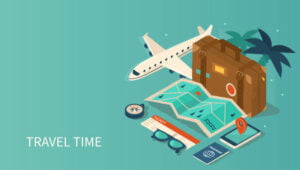Travel Software:

In the ever-evolving travel industry, where competition is fierce and customer expectations are sky-high, keeping your B2B clients happy is more crucial than ever. Today’s travel buyers demand seamless booking experiences, personalised travel options, and responsive customer service. So, how can you ensure your B2B travel business delivers consistent satisfaction and stands out from the crowd? The answer lies in leveraging the power of B2B travel software—your key to unlocking happier clients and a thriving business.
Why B2B Travel Software is Your Customer Satisfaction Powerhouse:
B2B travel software isn’t just about streamlining operations and boosting efficiency. It’s about empowering you to deliver exceptional customer experiences—the kind that builds trust, loyalty, and sustainable growth. Here’s how these powerful tools can transform your B2B travel business into a satisfaction haven:
1. Empowering Personalised Travel:
i. Multi-supplier integration: Forget limited options
Provide a wide range of travel options to your customers by integrating with numerous airlines, lodging options, tour companies, and activity providers. Make personalised itineraries that go beyond pre-made packages to accommodate a range of needs and tastes.
ii. Dynamic Packaging: Unleash your inner travel architect
Build unique journeys by seamlessly combining flights, hotels, activities, and transfers into bespoke travel packages. Personalisation becomes effortless, ensuring every client feels like your star traveller.
iii. Automated Recommendations: Let technology be your travel expert.
Leverage recommendation algorithms that suggest destinations, activities, and experiences based on client preferences, travel history, and current trends. Deliver surprise and delight with relevant suggestions that elevate their travel experience.
2. Streamlining Customer Journeys:
i. User-Friendly Booking Platform: Make bookings a breeze. Offer an intuitive and user-friendly platform where clients can navigate with ease, manage bookings, and access travel documents efficiently. Frustration-free booking fosters positive interactions and strengthens relationships.
ii. Real-time Updates: Transparency is key. Provide instant access to accurate pricing, availability, and booking confirmations. Real-time updates build trust and eliminate the stress of uncertainty, enhancing the overall customer journey.
iii. Mobile-First Design: cater to the on-the-go trend. Optimise your B2B travel software for mobile devices, allowing clients to manage bookings, access travel documents, and make on-the-fly changes, all from the palm of their hands. Convenience breeds satisfaction.
3. Elevating Customer Service:
i. Proactive Communication: Don’t wait for clients to reach out.
Utilise the software’s communication tools to send proactive updates, personalised reminders, and relevant travel information. Anticipating needs demonstrates care and keeps clients informed, solidifying positive relationships.
ii. Self-Service Options: Empower your clients.
Offer an online help desk, FAQs, and knowledge bases where clients can find answers and resolve issues independently. Autonomy and control contribute to a sense of empowerment and satisfaction.
iii. 24/7 Support: Be there when they need you.
Invest in reliable customer support channels like live chat, phone lines, and email, accessible 24/7. Prompt and responsive support builds trust and demonstrates a commitment to your client’s satisfaction.
4. Leveraging Data Insights:
i. Reporting and Analytics: Turn data into valuable insights.
Utilise built-in reporting tools to track booking trends, analyse customer behaviour, and identify areas for improvement. Data-driven decisions lead to personalised offerings, optimised experiences, and ultimately happier clients.
ii. Feedback Mechanisms: Listen to your clients.
Integrate feedback mechanisms like surveys and reviews to gather valuable insights into their experiences. Understanding their needs and addressing their concerns strengthens your relationship and fuels continuous improvement.
iii. Targeted Marketing: Personalisation goes beyond travel packages.
Leverage customer data to send targeted marketing campaigns, recommendations, and promotions relevant to each client’s preferences and travel history. Relevant communication shows value and fosters ongoing engagement.
Read More: The Benefits of B2B Order Management Software
Challenges to the B2B Travel Software Implementation:

Implementing B2B travel software, while offering immense potential for boosting customer satisfaction, can also bring some challenges. Here are some of the most likely ones:
1. Initial Investment: B2B travel software solutions can come with significant upfront costs, including purchasing the software itself, implementation fees, and potential hardware upgrades. This can be a hurdle for smaller businesses or those with limited budgets.
2. Change Management: Transitioning to a new software system can disrupt existing workflows and require employee training. Some team members might resist change or struggle to adapt to the new platform, leading to decreased productivity and potential errors.
3. Integration Issues: Integrating the software with existing travel booking systems, accounting software, and other enterprise tools can be complex and time-consuming. Data migration and ensuring seamless connectivity can pose technical challenges.
4. Security Concerns: B2B travel software handles sensitive client data, making security a top priority. Businesses need to invest in robust security measures to protect against cyberattacks and data breaches, which can damage client trust and reputation.
5. Limited Expertise: Some B2B travel businesses might lack the in-house technical expertise required to fully utilise the software’s features or troubleshoot technical issues. Relying on external consultants or support from the software vendor can add additional costs.
6. Return on Investment (ROI) Measurement: It can be challenging to quantify the exact ROI of implementing B2B travel software. Businesses need to define clear metrics and track key performance indicators (KPIs) like customer satisfaction, booking rates, and operational efficiency to demonstrate the software’s value.
7. Adapting to Industry Trends: The travel industry is constantly evolving, with new technologies and consumer preferences emerging rapidly. Businesses need to choose software that is flexible and adaptable to keep pace with these changes and ensure their systems remain relevant.
8. Competition: Implementing B2B travel software is becoming increasingly common, so businesses need to find ways to stand out from the competition by offering unique features, personalised experiences, and exceptional customer service.
While these challenges exist, with careful planning, effective implementation strategies, and ongoing support, B2B travel businesses can navigate these hurdles and successfully leverage the power of B2B travel software to create happier clients, streamlined operations, and ultimately, a thriving business.
Read More: Streamlining Supply Chains with ERP Software Solutions
Strategies for Effective Implementation of B2B Travel Software:

1. Invest in user training. Ensure your team embraces the software.
Provide comprehensive training and ongoing support to equip your staff with the necessary skills to confidently navigate the platform and utilise its features to their full potential.
2. Foster Internal Collaboration: Break down silos.
Align your departments around the shared goal of customer satisfaction. Encourage collaboration between sales, customer service, and operations to seamlessly address client needs and deliver flawless experiences.
3. Measure and Adapt: Data is your guide.
Regularly monitor key metrics like customer satisfaction scores, booking rates, and conversion rates. Analyse the data and adapt your strategies based on your findings. Continuous improvement through data-driven decision-making ensures your B2B travel software delivers its full potential for customer satisfaction and business growth.
4. Offer flexible payment options: Ensure that you cater to diverse needs by offering a variety of secure payment methods, including corporate accounts, credit cards, and invoicing options.
5. Invest in security and compliance: Ensure your software adheres to industry data security standards and regulations, building trust and transparency with your clients.
6. Partner with reliable vendors. Choose a B2B travel software provider with a proven track record of delivering on its promises and offering comprehensive support.
7. Get creative and experiment. Don’t be afraid to try new features, tools, and strategies to continuously improve your customer experience and keep your B2B travel software delivering its full potential.
By following these tips and strategies, you can leverage B2B travel software as your secret weapon for boosting customer satisfaction, building strong relationships, and driving sustainable growth for your B2B travel business. Now, go forth and make your clients smile!
Read More: Mastering Multi-Supplier Integration with B2B Travel Software
Conclusion:
In today’s competitive travel landscape, prioritising B2B customer satisfaction is no longer optional; it’s essential for survival. By embracing the power of B2B travel software, your business can unlock a world of possibilities. Imagine personalised travel experiences, streamlined customer journeys, and elevated service—all leading to happier clients who become loyal brand advocates. Invest in the right software, implement best practices, and harness the power of data to deliver exceptional experiences that turn satisfied clients into business champions.
Remember, B2B travel software is not just a technological tool; it’s a strategic investment in your future. By making customer satisfaction your top priority, you can unlock a new era of growth and success for your B2B travel business, leaving your competitors in the dust and charting a course towards a journey of happy clients and sustainable prosperity.










